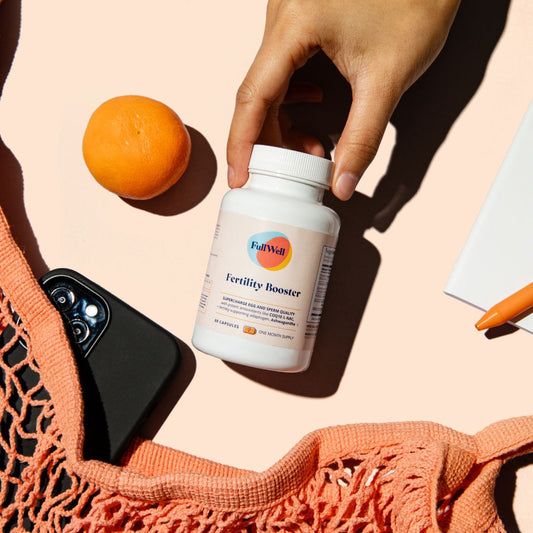Nourishing Egg and Sperm Quality with Ayla Barmmer MS, RD, LDN
Read more

How often have you heard the word ‘antioxidant’? It’s one of those pieces of wellness vocabulary that is hard to escape these days: Maybe you read it on the back of a food or beverage label, your face serum, or even read or heard about it right here in The Knowledge Well. Of course, with all that exposure, you probably know by now that antioxidants are good for you, but do you know why? Despite the word’s prevalence, we suspect many people are curious to learn about what antioxidants are, why they’re good for us, and their role in our fertility.
Let’s take a few minutes to clear things up! That way, you will be better prepared to understand the complete picture regarding our discussions and formulations surrounding oxidative stress.
In simple terms, antioxidants are small molecules that help support the body’s free radical defenses against molecules that have gone rogue (more on that later). While our body can make antioxidants, we can also boost our intake through certain foods, lifestyle choices, and supplements.
There are many different types of antioxidants, and they all play different roles in our body, from heart disease to fertility. For example, many vitamins and minerals in FullWell’s Prenatal and Multivitamins for both men and women have antioxidant properties, including selenium, vitamin C, and vitamin E. Other more familiar and buzzier ones include turmeric and N-acetyl cysteine or NAC. When it comes to fertility, however, some antioxidants have protective effects on sperm and eggs, while others may play a role in protecting our bodies against other diseases (1).
Your body goes through a process called oxidation, which is natural and essential. Oxidative stress, on the other hand, is an imbalance of free radicals and antioxidants in the body. Unlike antioxidants, free radicals are unstable atoms that can damage cells by taking electrons from other molecules. Antioxidants are like peacekeepers that calm and stabilize free radicals in several ways, including giving the frantic free radical molecules an extra electron. Free radicals and antioxidants typically exist in a state of balance, but whenever that balance is off, it causes oxidative stress (1).
Oxidative stress can cause damage to fatty tissue, DNA, and proteins in your body, which can over time, impact health. Fertility is also impacted by oxidative stress, as eggs and sperm are susceptible to significant damage from this imbalance. In women, for example, oxidative stress can negatively impact oocytes (egg cells), embryos, and implantation (2, 3). In men, sperm - relatively fragile cells - are more vulnerable to damage from oxidative stress than other cells in the body. As a result, nearly 40-50% of subfertile men have abnormal sperm quality and often suffer from a condition known as male oxidative stress infertility (MOSI), a new term established in 2019 (4).
Antioxidants can help improve and protect egg and sperm quality, supporting the body’s free radical defenses and maintaining DNA integrity, among many other things. Upping your intake of antioxidants via food, lifestyle changes, and supplements can help support your body’s free radical defenses (5, 4).
Oxidative stress is a natural part of our body's cellular processes, so while we can’t wholly avoid it, it’s essential to address sources of oxidative stress in every aspect of your life to help restore this balance, especially if your fertility is a current focus for you. Unfortunately, given our modern environments, it is almost impossible to avoid all oxidative stress. For context, oxidative stress can be the result of:
Quitting tobacco, pulling back on drinking, improving the air quality in your home, getting more and better quality sleep, drinking filtered tap water, moving regularly, eating a colorful antioxidant-rich diet, and choosing supplements that provide a hefty dose of antioxidants, can be a great way to help balance the antioxidant/oxidative stress see-saw.
Though we are food-first dietitians here at FullWell, we also firmly believe in a need for many to supplement their diets to help enhance fertility. That's why we expertly formulated our Fertility Booster, a first-of-its-kind antioxidant support supplement designed to help optimize egg and sperm quality in the preconception period.
When conception isn’t achieved on a couple’s expected timetable, the notion of suboptimal fertility or defunct eggs or sperm can cause stress and anxiety for many men and women.
Optimizing your fertility by improving the quality of your eggs and sperm at least 3-6 months before trying to conceive can be a powerful step forward in your fertility journey.
